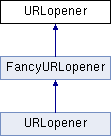|
Vega strike Python Modules doc
0.5.1
Documentation of the " Modules " folder of Vega strike
|
|
Vega strike Python Modules doc
0.5.1
Documentation of the " Modules " folder of Vega strike
|

Public Member Functions | |
| def | __init__ |
| def | __del__ |
| def | close |
| def | cleanup |
| def | addheader |
| def | open |
| def | open_unknown |
| def | open_unknown_proxy |
| def | retrieve |
| def | open_http |
| def | http_error |
| def | http_error_default |
| def | open_https |
| def | open_gopher |
| def | open_file |
| def | open_local_file |
| def | open_ftp |
| def | open_data |
Data Fields | |
| proxies | |
| key_file | |
| cert_file | |
| addheaders | |
| tempcache | |
| ftpcache | |
| type | |
Static Public Attributes | |
| string | version = "Python-urllib/%s" |
Class to open URLs. This is a class rather than just a subroutine because we may need more than one set of global protocol-specific options. Note -- this is a base class for those who don't want the automatic handling of errors type 302 (relocated) and 401 (authorization needed).
| def __init__ | ( | self, | |
proxies = None, |
|||
| x509 | |||
| ) |
| def __del__ | ( | self) |
Definition at line 123 of file urllib.py.
References FileWrapper.close(), StringIO.close(), Shelf.close(), Chunk.close(), _Subfile.close(), SGMLParser.close(), openrsrc.close(), URLopener.close(), _socketobject.close(), SSLFakeSocket.close(), _Hqxcoderengine.close(), SSLFakeFile.close(), FileInput.close(), TemporaryFileWrapper.close(), _fileobject.close(), _Rlecoderengine.close(), HTTPResponse.close(), BinHex.close(), GzipFile.close(), Telnet.close(), Au_read.close(), _Hqxdecoderengine.close(), Aifc_read.close(), _Rledecoderengine.close(), HTTPConnection.close(), Au_write.close(), HexBin.close(), TestSGMLParser.close(), file_wrapper.close(), FTP.close(), SMTP.close(), and HTTP.close().
| def addheader | ( | self, | |
| args | |||
| ) |
Add a header to be used by the HTTP interface only
e.g. u.addheader('Accept', 'sound/basic')
| def cleanup | ( | self) |
Definition at line 129 of file urllib.py.
References URLopener.__tempfiles, URLopener.__unlink, and URLopener.tempcache.
| def close | ( | self) |
| def http_error | ( | self, | |
| url, | |||
| fp, | |||
| errcode, | |||
| errmsg, | |||
| headers, | |||
data = None |
|||
| ) |
Handle http errors. Derived class can override this, or provide specific handlers named http_error_DDD where DDD is the 3-digit error code.
Definition at line 305 of file urllib.py.
References URLopener.http_error_default().
| def http_error_default | ( | self, | |
| url, | |||
| fp, | |||
| errcode, | |||
| errmsg, | |||
| headers | |||
| ) |
| def open | ( | self, | |
| fullurl, | |||
data = None |
|||
| ) |
Use URLopener().open(file) instead of open(file, 'r').
Definition at line 149 of file urllib.py.
References URLopener.proxies, urllib.splithost(), urllib.splittype(), URLopener.tempcache, urllib.toBytes(), and urllib.unwrap().
| def open_data | ( | self, | |
| url, | |||
data = None |
|||
| ) |
Use "data" URL.
Definition at line 491 of file urllib.py.
References base64.decodestring(), dospath.join(), and urllib.unquote().
| def open_file | ( | self, | |
| url | |||
| ) |
Use local file or FTP depending on form of URL.
Definition at line 400 of file urllib.py.
References URLopener.open_ftp(), and URLopener.open_local_file().
| def open_ftp | ( | self, | |
| url | |||
| ) |
Use FTP protocol.
Definition at line 435 of file urllib.py.
References URLopener.ftpcache, urllib.ftperrors(), mimetypes.guess_type(), dospath.join(), urllib.splitattr(), urllib.splithost(), urllib.splitpasswd(), urllib.splitport(), urllib.splituser(), urllib.splitvalue(), and urllib.unquote().
| def open_gopher | ( | self, | |
| url | |||
| ) |
Use Gopher protocol.
Definition at line 384 of file urllib.py.
References urllib.noheaders(), gopherlib.send_query(), gopherlib.send_selector(), urllib.splitgophertype(), urllib.splithost(), urllib.splitquery(), and urllib.unquote().
| def open_http | ( | self, | |
| url, | |||
data = None |
|||
| ) |
Use HTTP protocol.
Definition at line 249 of file urllib.py.
References URLopener.addheaders, base64.encodestring(), URLopener.http_error(), urllib.proxy_bypass(), urllib.splithost(), urllib.splittype(), urllib.splituser(), string.strip(), URLopener.type, and urllib.unquote().
| def open_https | ( | self, | |
| url, | |||
data = None |
|||
| ) |
Use HTTPS protocol.
Definition at line 327 of file urllib.py.
References URLopener.addheaders, URLopener.cert_file, HTTPSConnection.cert_file, HTTPS.cert_file, base64.encodestring(), URLopener.http_error(), URLopener.key_file, HTTPSConnection.key_file, HTTPS.key_file, urllib.splithost(), urllib.splittype(), urllib.splituser(), string.strip(), URLopener.type, and urllib.unquote().
| def open_local_file | ( | self, | |
| url | |||
| ) |
Use local file.
Definition at line 407 of file urllib.py.
References rfc822.formatdate(), mimetypes.guess_type(), urllib.localhost(), URLopener.open(), urllib.splithost(), urllib.splitport(), urllib.thishost(), and urllib.url2pathname().
| def open_unknown | ( | self, | |
| fullurl, | |||
data = None |
|||
| ) |
Overridable interface to open unknown URL type.
Definition at line 184 of file urllib.py.
References urllib.splittype().
| def open_unknown_proxy | ( | self, | |
| proxy, | |||
| fullurl, | |||
data = None |
|||
| ) |
Overridable interface to open unknown URL type.
Definition at line 189 of file urllib.py.
References urllib.splittype().
| def retrieve | ( | self, | |
| url, | |||
filename = None, |
|||
reporthook = None, |
|||
data = None |
|||
| ) |
retrieve(url) returns (filename, None) for a local object or (tempfilename, headers) for a remote object.
Definition at line 195 of file urllib.py.
References tempfile.mktemp(), Pattern.open, _posixfile_.open(), URLopener.open(), Template.open(), Telnet.open(), URLopener.open_local_file(), urllib.reporthook(), urllib.splitattr(), urllib.splithost(), urllib.splitquery(), urllib.splittype(), URLopener.tempcache, urllib.toBytes(), urllib.unwrap(), and urllib.url2pathname().